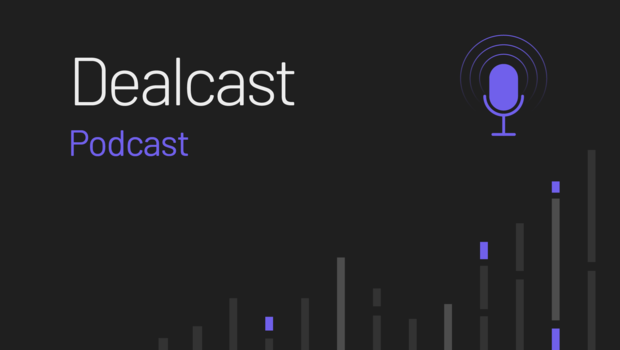Podcast: European TMT Deal Activity Continues Roaring
29 September 2021
European TMT Deal Activity Continues Roaring
This week we’re finding out how the appetite for digital services is driving Europe deal activity in the technology, media and telecoms (TMT) sector. Joining host Julie-Anna Needham are Amy-Jo Crowley, head of TMT at Mergermarket, and Charlie Taylor-Kroll, senior TMT reporter for Mergermarket. Dealcast is presented by Mergermarket and SS&C Intralinks.
In this episode, you'll learn about:
- TMT deal activity in Europe for H1 2021
- Trends driving the boom in activity
- The forecast for valuations in the sector
Transcript
[MUSIC PLAYING] JULIE-ANN NEEDHAM: Welcome to Dealcast, the weekly M&A podcast presented to you by Mergermarket and SS&C Intralinks. I'm Julie-Anna Needham. This week we're finding out how the appetite for digital services is driving European deal activity in the technology, media, and telecoms or TMT sector. Joining me are Amy-Jo Crowley, Head of TMT for Mergermarket, and Charlie Taylor-Kroll, who is a Senior TMT reporter. Hi Charlie. Hi Amy-Jo.
CHARLIE TAYLOR-KROLL: Hello.
AMY-JO CROWLEY: Hi Julie-Anna. Delighted to be here.
JULIE-ANN NEEDHAM: Great. Thank you both for joining me today. So can we start off with a big picture? What kind of deal activity is the TMT sector in Europe seen in the first half of 2021?
AMY-JO CROWLEY: Of course, it's been another unprecedented year in terms of deal value. USD 125.2 billion worth of deals were recorded across 1800 plus transactions in the first six months, the highest this decade and 73 percent up from a year earlier. And I think people are saying that activity really hasn't stopped since August 2020, and people are just getting exhausted as well. I was speaking with people, and they've been telling me complaining that they've been working throughout their holidays, demands from private equity firms to conduct further due diligence in the early hours of the morning.
And there's so much work to do and also demand for junior talent that people are even hiring juniors without having interviews. There have been some stories about that in the press, and we've heard about this as well.
JULIE-ANN NEEDHAM: Sorry, is that banks? Is that law firms?
AMY-JO CROWLEY: It's more banks. It's more banks that are doing this. That's what I've been told as well. I'm not too sure about law firms, but there have been reports that law firms have increased their salaries from 100,000 plus as a starting salary over in the US to attract new talent as well. That just shows how demand and valuable they are at this point, and we think it's just because of the unprecedented levels of M&A activity across TMT as a whole.
CHARLIE TAYLOR-KROLL: Just adding to those points, obviously, as pointed out, it's been incredibly busy, and everyone has been incredibly busy. Among within that TMT space, the busiest sections have certainly been those digitally facing services, whether that's on a bottom level infrastructure with telecoms, with fiber assets, or whether that's software as a service or those critical assets which have allowed us to work remotely, work in exceptional circumstances. And these are the bonds which have really been catching the eyes of the private equity firms and been at the forefront of deal-making activity globally for the best parts of the last 18 months.
JULIE-ANN NEEDHAM: Great. Thank you. And so you touched on it a bit there, Charlie, with the remote working trend. But what other trends are driving this boom in activity?
CHARLIE TAYLOR-KROLL: A lot of it is down to obviously the reliance or the need now of super-fast internet as the world goes more digital in many spaces, whether that's the, as I said, the internet or the payment segment. As things start to go remote and online, the assets which are most digitally facing are the assets which are the hottest. So that could be anything from software as a service, from telecoms towers and fiber or fintech assets, which I'm sure we'll touch upon later on.
As well as that combined by that-- famously, there's been record numbers of private equity dry powder. So with that, coupling those two things in mind, these public companies which are offering the attractive services and assets are the ones that the private equities are potentially looking to take privates off. And we've already seen several mega-deals which have taken place in the first part of the year.
JULIE-ANN NEEDHAM: And Amy-Jo, did you have anything to add to that?
AMY-JO CROWLEY: Yeah, just added to his point on records amount of dry powder. I think private equity sponsors they're looking for business models that are resilient subscription as a service where they see reliable recurring revenue streams on a monthly annual basis. And this has driven tech valuations to record numbers. One of the key deals in the first half of the year in the private sector was the sale of Calypso, an asset that was acquired for well under a billion just a couple of years ago, which fetched this year 3.75 billion or a record 37.5 Ebitda multiple for 2020. That was a key deal and also the sale of activity as well.
And we're also seeing this with consumer technology. So one of the biggest deals this year on the Consumer Technology side was the online car platform Cazoo, which was only set up three years ago. And they conducted a deal with SPAC that valued at USD 7 billion. And again, this is all added to Charlie's point on it being a digital platform and the bet that consumers will be buying more cars online with this platform and receiving the cars at their homes as opposed to buying them face to face with a car dealer.
JULIE-ANN NEEDHAM: OK, thank you. So turning our attention to some of the companies of interest in the space. Start off with Atos, which is a French IT group. As we've already mentioned, the tech sector has obviously been one of the hottest sectors for corporate activity recently. Why is Atos of interest?
CHARLIE TAYLOR-KROLL: So Atos is a very interesting one and one we actually reported on as being a potential take private candidate. Atos is a IT services company based in France and very well regarded as the crown jewels of listed tech firms in Europe. So the idea that now it's garnishing private equity interest suggests there is appetite for sponsors, especially from the US, to be looking at potentially undervalued tech firms in Europe. And this is a very good example of that.
With tech valuations being at record highs, sponsors are now looking at deals which might make sense because there's perhaps a depression of valuation in the public markets. And we also look at companies which could potentially have be undervalued in the public domain. This company itself would be a multi-billion pound deal. Our story, in fact, rocketed the share price. So it's a very interesting take and certainly interesting in the wider trends about future tech valuation, as I'm sure AJ will explain.
JULIE-ANN NEEDHAM: Sure, and we'll come onto that in a minute. So another company you're keeping an eye on is the fintech group banking circle. Can you briefly explain what the company does and why that's on your radar, Amy-Jo?
AMY-JO CROWLEY: Yes, of course. Banking Circle is a pretty exciting payments infrastructure company which supplies cross-border payments to banks and payment companies, and it also operates a licensed credit institution. And this is on our radar because EQT is exploring options for it. They've hired banks. We reported on this. And they're looking to either conduct a SPAC deal that would value it at more than 5 billion. Now, in terms of valuations, EQT acquired this just for 200 to 300 million euro only a couple of years ago.
So again, this shows the value that investors are placing on the resilience of payments companies as we move towards a cashless society. This is on the back of some of the largest fundraisers in payments, such as Revolut in the UK, which received a USD 10 billion-plus valuation after receiving an investment from SoftBank. And also the listing of WYSE in the U.K., which was a standout success as well. So it's an example of just the amount of activity that's happening at the moment.
JULIE-ANN NEEDHAM: Well, some pretty massive valuations there and obviously showing how much interest there is in the payments and fintech space. So turning away from fintech and looking at the media space, Asmodee is another French company. Can you tell us what Asmodee does and why it's of interest?
AMY-JO CROWLEY: Yes. Asmodee is a very successful and large gaming company in France that publishes games from Pokemon cards and Star Wars. And this has been a real lockdown success story. They've had a fantastic year in terms of revenue growth. And after that, PAI, its owners they've been receiving in bounds over the summer from sponsors that are looking to take it to its next level of growth.
And this is on the back of just more people playing games in lockdown, and that fueling its growth. But I think the concern from investors is just how sustainable this growth is as we return to a new normal. And I think people around this are waiting for more data on how its revenues might look in the future, which will determine its valuation. But it's an example, Asmodee, of the attention that gaming companies are receiving at the moment.
There have been a lot of deals. And I think we wrote a preview on that in the last quarter. Charlie, didn't we?
CHARLIE TAYLOR-KROLL: We did. We did indeed. And as AJ rightly points out, it's been such a stand-out industry, the gaming sector. A lot to do with the fact that people don't have much else to do while being stuck inside. So it certainly remains to be seen once we are all finally and permanently let out of our cages whether that will be as buoyant as it has been over the last year.
JULIE-ANN NEEDHAM: Well, it will be very closely watched where I live in Leamington Spa, which is home to a lot of UK gaming companies. And finishing off with the telecoms part of TMT. There have been a lot of restructuring in asset sales in the tower space. Can you tell us about what the Norwegian company Telenor is planning to do with its newly established tower company? And how that kind of structuring or spin-out is reflective of what other players in the industry have done.
CHARLIE TAYLOR-KROLL: Of course. So Telenor is a very interesting one in the sense that it's alongside Telia-- the two biggest telco providers in the Nordic region. And we reported on the fact that they're looking for options to find a stake for their tower company. Now, this is very much reflective of a wider trend which has gone across Europe, but more specifically, it's on the back of essentially its counterpart company Telia doing something very similar, selling a stake in its tower company to Brookfield earlier this year for a very punchy multiple.
So you can see with these two in mind, this is a trend which telco after telco is following each other, looking at how much value they can unlock by firstly operationally separating out their tower companies. And then also looking for an investor, who'll see them as long-term and important aspects of infrastructure, and which also means for these companies they can garnish a very high valuation and monetize more than they would as a whole body.
JULIE-ANN NEEDHAM: Yeah. And I think it's a good example of how all of those different elements of the wider TMT sector are linked because nothing actually works without the infrastructure in place.
CHARLIE TAYLOR-KROLL: Exactly. And another very good example is the rollout of fiber, which at the moment is almost a land grab among European players. Who's going to be the person to get the fiber down the ground first and be able to monopolize or at least monetize those people who want super broadband? And you're seeing that particularly in the UK where the O2 Telefonica newly combined company are looking to find investors to try and accelerate the speed of rollout there.
JULIE-ANN NEEDHAM: Great, thank you. So I'd like to get some final thoughts from you on what we're likely to see in the TMT space during the end of 2021 and into 2022.
AMY-JO CROWLEY: I think we're going to see more P2Ps and particularly in the media space. One of the key deals was DMGT. The owner of DMGT Rothermere or one of the key stakeholders taking the consumer part private and then selling off the B2B assets. I think we're going to see probably more carve-outs coming from that with its B2B assets if that's [INAUDIBLE], property tech, business, or land markets property intelligence business after it selling RMS, its insurance business, for a record price more than 1 billion to Moody's as well, which again shows appetite for SaaS platforms as well.
There's a lot of talk about what will happen to Informa, the exhibition company if private equity firms will take it private and look to break it up and gain value that way by selling off the B2B assets and holding out for a return when exhibitions hopefully return to normal. And there's also talk about Euromoney as well and whether that could be taken private as it looks to merge some of its crown jewel assets if it's fast markets with other key competitors such as Argus Media. And there's also talk about how broadcasting might continue to consolidate, whether that's on a domestic level or continental level, following the announcement that group M6 in France that it's trying to merge with its counterparts TF1. And that's currently being reviewed by the regulators.
And if that is approved in the next 6 to 12 months, then there's the question on whether RTL will look to combine with its German competitor, ProSieben, for example, or ITV potentially combining with channel 4, which is undergoing privatization talks by the government, its owner as well. So it's very exciting to see how it will all play it. And we'll be keeping our ears to the ground on that.
JULIE-ANN NEEDHAM: And just a follow-up question. There's obviously a lot of activity within all of those subsectors within TMT, but do you see the valuations remaining high? And how do they play out with the auctions at the moment?
CHARLIE TAYLOR-KROLL: So certainly from conversations I've been having, the expectation from deal makers is that the valuations we're seeing, especially among tech, will remain for the remainder of the year at least. And the impression we have is that us, deal makers, we're bracing for an incredibly busy period, starting this month and leading all the way up till December. But that said, there have been certain warnings that some of these tech companies, albeit important and valuable, are being overvalued.
A good example is the sale of the health care software provider Civica by Partners Group, which is meant to get being pitched at about a 3 billion valuation. It's a sale process, which has stalled despite initial sponsor interest. From our understanding, a lot to do with the price expectations. So there has been warnings where there has been a bit too much ambitious pitching of valuations. But by and large, at the moment, the valuations look like they're going to stay for the medium term.
JULIE-ANN NEEDHAM: Great. Thank you, Amy-Jo and Charlie.
CHARLIE TAYLOR-KROLL: Thank you very much.
AMY-JO CROWLEY: Thank you.
JULIE-ANN NEEDHAM: That was Amy-Jo Crowley and Charlie Taylor-Kroll. Thank you for listening to this week's episode of Dealcast presented by Mergermarket and SS&C Intralinks. Please rate, review, and follow the podcast. You can find us on Apple Podcasts, Spotify, or look out for your Mergermarket news alert. For more information, check out our show notes. Join us next week for another episode.


